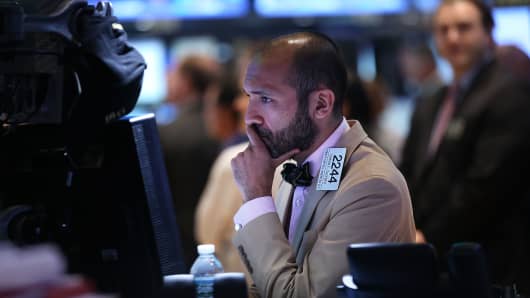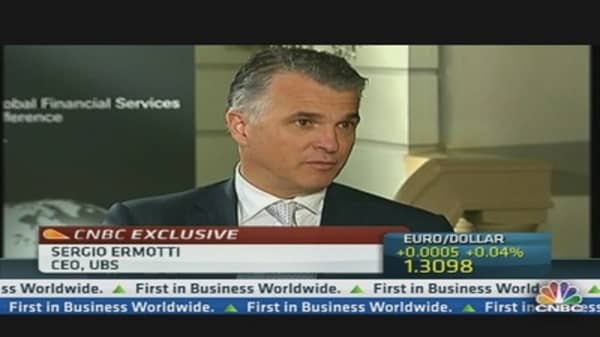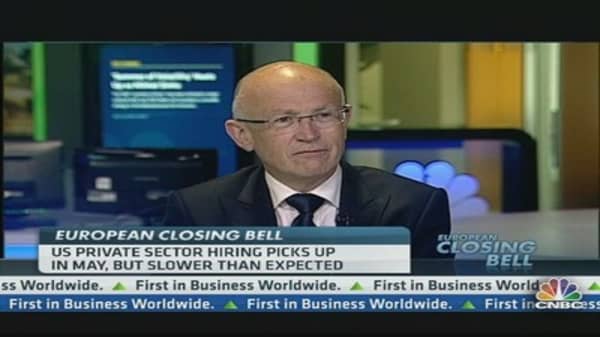Volatility in global stock markets and a jump in treasury yields over the past month have highlighted investor concerns that the Fed could start tapering its bond-buying program. But now economists, including those at Goldman Sachs, are questioning whether markets have over-reacted.
"Concerns about rising bond yields and a Fed tapering of bond purchases have dominated the last two weeks. Investors have worried in particular that the shifts in the bond market will derail the positive trend in U.S. and global equity markets. We think those anxieties are overdone," Goldman's economics research team said in a note on Thursday morning.
Seemingly conflicting reports over the U.S. economy, prompted a sharp decline in U.S. stocks on Wednesday, with the Dow ending below 15,000, as fears spread that the Fed could start tapering its $85 billion-a-month asset purchase program. Conversely, the yield on 10-year Treasurys rose 3 basis points to 2.15 percent on Wednesday, rising from 1.63 percent a month ago.
"Despite the recent sharp rise in yields, they are not much higher than earlier in the year. The sharp drop in yields in March and April looks more unusual. Nor do we think the Fed's approach has changed. With U.S. inflation below target and the growth picture still moderate, we see little sign that the Fed will move away from its supportive monetary stance," Goldman analysts said, adding that there was no reason why equities and yields "can't rise together".
Goldman forecast a steady rise in yields over the next 12-18 months with yields of 2.5 percent forecast for the end of 2013.
"I've seen various examples of how tapering is going to affect 10-year Treasury yields, people are saying it could have an upwards impact of 25-30 basis points on ten-year yields, but I'm not convinced by the methods they use to get those numbers," Phil Tyson, rates strategist at inter-dealer broker ICAP, told CNBC Europe's "Squawk Box."
"But you have to say, given the moves we've seen in mortgage rates and given the moves we've seen in yields in the last month or so, that tapering is definitely, at least partially, priced in - and you have to question just how much more of a sell-off we'll see," he added.
(Read More: Fed, Bond Market Tango to Get Hotter)
U.S. mortgage rates indeed appear to have already priced in tapering fears with interest rates on 30-year mortgages climbing 17 basis points to average 4.07 percent in the week ended May 31, the Mortgage Bankers Association reported on Wednesday -- the first time rates have been above 4 percent since early May of last year. Comments from members of the Federal Reserve have not helped to allay investor fears either.
On Wednesday, Dallas Fed chief Richard Fisher called for a tapering of quantitative easing, saying the Fed shouldn't bother about market worries that "monetary cocaine" was being withdrawn.
(Read More: Fed's Fisher: We Cannot Live in Fear of 'Monetary Cocaine')
Fed Chairman Ben Bernanke told Congress in late May that the Fed could consider reducing its purchases within the "next few meetings" though he reiterated that any change would depend on economic data and the labor market.
'The Market Always Over-Reacts'
The cause of Wednesday's U.S. stock market sell-off was mixed economic reports. While the ADP employment report showed that the private sector created just 135,000 jobs in May, less than the 165,000 estimated, the Federal Reserve's latest Beige Book survey showed expansion throughout the U.S. from April through mid-May.
The data caused stocks to post their worst one-day drop in two months, European market also closed lower, and on Thursday, the trend continued when stocks slumped in Asia.






